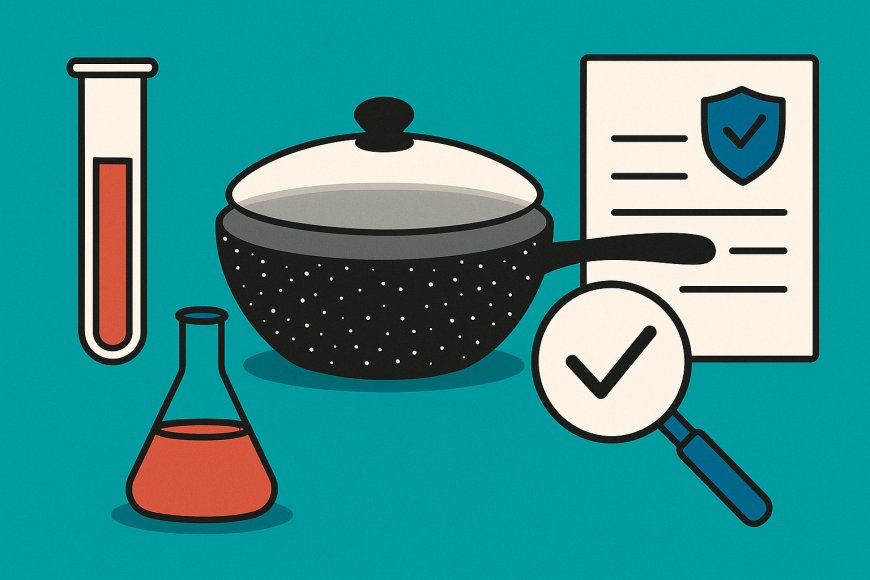Fact vs. Rumor: The Scientific Basis of Consumer Protection in Saudi Arabia
This article debunks common rumors about E127 dye and granite cookware by explaining the rigorous scientific and regulatory framework of the Saudi Food and Drug Authority (SFDA) and Saudi Standards, Metrology and Quality Organization (SASO) that protects consumers.

Debunking Rumors: The Falsehoods of E127 and Granite Cookware
In the digital age, misinformation can spread faster than facts, creating unnecessary public anxiety. Two recent rumors exemplify this trend: the first claimed the Kingdom of Saudi Arabia was slow to ban the synthetic red dye E127, and the second warned of carcinogenic dangers from granite cookware. Both claims are built on flimsy foundations.
The rumor about E127 (Erythrosine) fails to acknowledge the independent and proactive approach of the Saudi General Food and Drug Authority (SFDA). The SFDA has been evaluating this dye for years and, contrary to the rumor, made a decision to regulate and ban certain products containing it even before the US issued its final decision. This demonstrates a sovereign regulatory system that does not simply follow external directives.
Similarly, the fear surrounding granite cookware is baseless. The cookware, which is manufactured with multiple layers, is not made from natural rock. The Saudi Standards, Metrology and Quality Organization (SASO) has confirmed that these products are safe if they meet Saudi specifications and are used correctly. A conformity certificate requires rigorous lab testing to ensure the product poses no risk of leaching heavy metals or other harmful substances. Spreading such unsubstantiated claims only serves to create distrust in regulatory institutions, not to protect public health.
A Strategic System of Consumer Protection
The Kingdom's approach to consumer safety goes far beyond reacting to rumors. It is a robust, proactive system built on a trinity of knowledge, oversight, and responsibility. The SFDA and SASO are not merely reactionary bodies; they are part of a national project focused on consumer protection.
One of the first lines of defense is the conformity certificate. Before any product, whether imported or domestic, can enter the market, it must prove that it adheres to Saudi technical specifications. This is not a simple administrative process but a rigorous review based on reports from internationally accredited bodies. This system acts as a crucial filter, preventing unsafe goods from ever reaching shelves.
After a product enters the market, the protection continues through field monitoring programs. Regulatory bodies routinely collect product samples from stores to verify that their actual components match their labels and technical data. This continuous monitoring not only catches violations but also provides a live database for evaluating risks and informing future policies.
What the public often doesn't see is this integrated supervisory system working behind the scenes. It relies on a network of electronic links with customs, global databases that flag hazardous products, and risk-tracking methodologies. This system operates silently, like an immune system, protecting the consumer without the need for constant public announcements.
The Conscious Consumer: A Partner in Protection
In a world filled with constant warnings and viral videos, it's essential for consumers to be partners in this system of protection, not simply tools for spreading misinformation. A truly conscious consumer is one who prioritizes verification over sharing, trusts their national institutions, and understands that effective oversight is a continuous process, not a sudden reaction.
Many viral warnings are often about issues that have already been identified, investigated, and addressed by regulatory authorities long before they gain attention on social media. When someone shares an unverified warning, they may be unknowingly contributing to public panic and eroding trust in the very institutions designed to keep them safe.
Instead of seeking a "digital reward" through retweets and likes, consumers should focus on credibility over spread, science over emotion, and institutional trust over momentary panic. Consumer protection is not a battle fought through hashtags but a continuous national project managed by experts who are silent when they should be and speak up when their voices are truly needed.
What's Your Reaction?












































































































